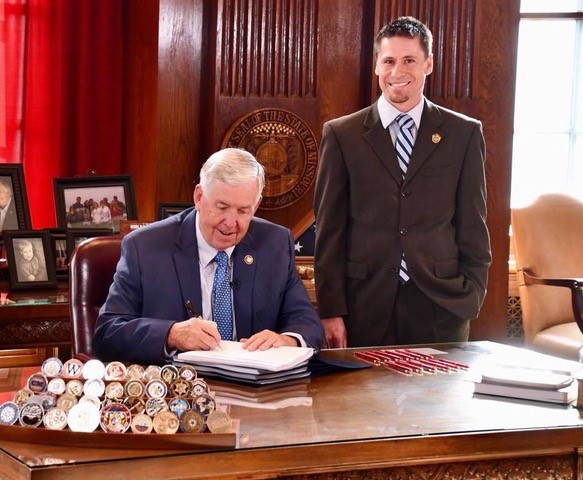
Wayfair Levels the Playing Field for Missouri Businesses
On Wednesday, June 30, Governor Parson signed Senate Bill 153 into law. Commonly referred to as the “Wayfair Bill,” SB 153 requires online retailers to collect sales tax on all internet purchases made by Missouri consumers. Our current tax code only requires online retailers with a brick-and-mortar presence in Missouri to collect sales tax. This legislation extends this requirement to all online retailers who make more than $100,000 annually on purchases made by Missouri consumers.
The COVID-19 pandemic has been devastating for all Missourians, but especially for our state’s businesses. Even before the pandemic, our businesses were struggling to stay competitive with online retailers — and the shutdowns caused by the pandemic have only made it worse. By not collecting sales tax, this incentivized consumers to buy from online retailers, which are often direct competitors with Missouri businesses. From a tax policy perspective, SB 153 levels the playing field for local businesses competing with online out-of-state businesses.
This legislation also creates the “Missouri Working Family Tax Credit Act,” a state level earned income tax credit (EITC) that will provide tax relief to low-income workers.
SB 153 calls for further cuts to the state’s income tax rate if state revenues continue to grow. Current law allows the state income tax rate to be cut by 0.5%, in increments of 0.1%, if certain revenue triggers are met. Senate Bill 153 allows for three additional 0.1% cuts, on top of the existing reductions, for a total possible income tax cut of 0.8%.
In addition to that, SB 153 includes Senate Bill 22, which helps prevent your taxpayer dollars from being used to fund risky development projects in flood plains. This legislation prohibits new development projects from using TIF in areas designated by the Federal Emergency Management Agency (FEMA) as a floodplain, and it prohibits new TIF projects in “Greenfield areas” which is agricultural land located outside of city limits or land that is substantially surrounded by properties with agricultural zoning classifications. This legislation also requires local projects seeking TIF to provide a study by a land use planner, urban planner, licensed architect, licensed commercial real estate appraiser or licensed attorney that details how the area meets the criteria necessary to receive TIF. It’s important to note that this legislation does not end development in flood plains, but rather the use of your tax dollars in risky private developments. Incentivizing the use of tax dollars in flood plains is bad policy. If a developer wants to gamble and build in a floodplain, they should assume all of the risk — not taxpayers.
I want to thank Gov. Parson for signing this critical legislation into law. I believe it is one the best ways we can support our local businesses and ensure they have a fighting chance against online retailers. I have been working for years to pass this legislation, and I am proud of the hard work my colleagues and I put into getting this bill across the legislative finish line.

